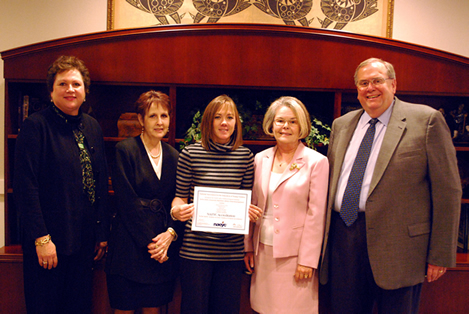

Delta State University’s Hamilton-White Child Development Center, has earned accreditation from the National Association for the Education of Young Children (NAEYC) – the nation’s leading organization of early childhood professionals.
“We’re proud that the Center has earned the mark of quality from NAEYC, with recognition for the faculty and staff’s commitment to reaching the highest professional standards,” said Dr. Jan Haynes, chair of the Division of Family and Consumer Sciences where the Center is housed.
Dr. Leslie Griffin, dean of the College of Education, noted that Dr. Haynes, Ms. Leigh-Anne Gant, director of Delta State University’s Preschool Programs, center faculty, and parent partners have worked diligently and with vision for the past several years toward this mark of distinction. “NAEYC Accreditation lets families in our community know that children in our program are getting the best care and early learning experiences possible.” The Hamilton-White Child Development Center provides quality child care in a healthy and stimulating environment with an integrative curriculum that addresses the four developmental areas: Physical, cognitive, social, and emotional, while providing Child Development training opportunities for students in Delta State University’s Child Development program of study.
To earn NAEYC Accreditation, the Delta State Child Development Center went through an extensive self-study process, measuring the program and its services against the ten NAEYC Early Childhood Program Standards and more than 400 related Accreditation Criteria. The program received NAEYC Accreditation after an on-site visit by NAEYC Assessors to ensure that the program meets each of the ten program standards. NAEYC-accredited programs are also subject to unannounced visits during their accreditation, which lasts for five years.
In the 25 years since NAEYC Accreditation was established, it has become a widely recognized sign of high-quality early childhood education. More than 7,000 programs are currently accredited by NAEYC – approximately 8 percent of all preschools and other early childhood programs.
“The NAEYC Accreditation system raises the bar for child care centers and other early childhood programs,” said Jerlean E. Daniel, Ph.D, executive director of NAEYC. “Having earned NAEYC Accreditation is a sign that Delta State University’s Hamilton-White Child Development Center is a leader in a national effort to invest in high-quality early childhood education.”
The NAEYC Accreditation system has set voluntary professional standards for programs for young children since 1985. In September 2006, the Association revised program standards and criteria to introduce a new level of quality, accountability, and service for parents and children in child care programs. The new standards today reflect the latest research and best practices in early childhood education and development. NAEYC is committed to utilizing the newest studies and analysis on positive child outcomes to ensure young children continue receiving the highest-quality care and education possible.
The NAEYC Accreditation system was created to set professional standards for early childhood education, and to help families identify high-quality preschools, child care centers and other early education programs. To earn NAEYC Accreditation, a program must meet each of the ten NAEYC Early Childhood Program Standards. Programs are accredited by NAEYC for a five-year period.
For more information about NAEYC Accreditation, visit www.naeyc.org/academy.

